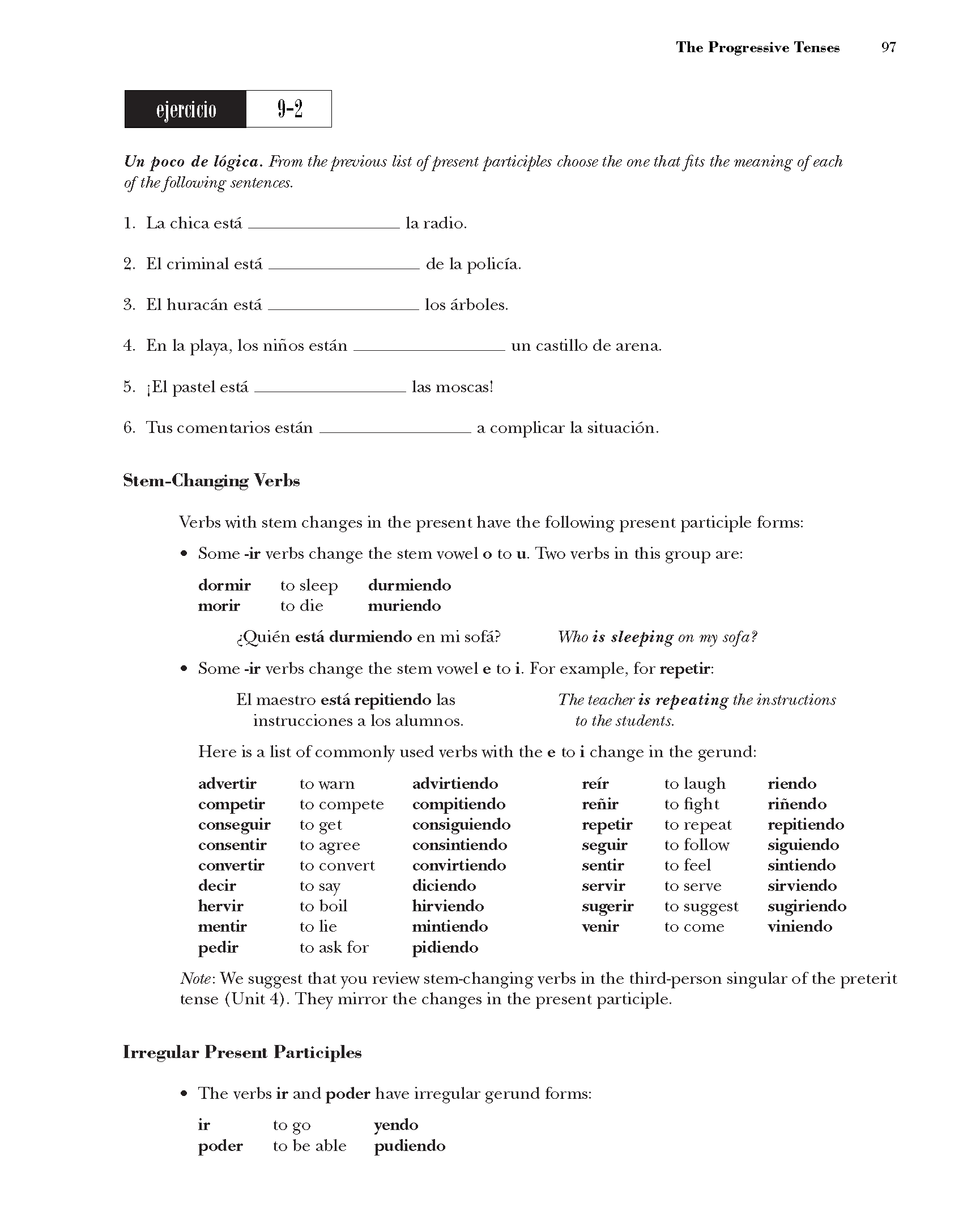CSG108

The Progressive Tenses
97
9-2
ejercicio
Un poco de lógica. From thepreuious list ofpresent participles choo.se the one thatfits the meaning of each of the following sentences.
1. La chica esta_la radio.
2. El criminal esta_de la policia.
3. El huracan esta_los arboles.
4. En la playa, los nińos estan_un castillo de arena.
5. jEl pastel esta_las moscas!
6. Tus comentarios estan_a complicar la situación.
St em-C11ai igii ig Yerbs
Yerbs with stem chan ges in the present have the following present participle forms:
• Some -ir verbs change the stem vowel o to u. Two verbs in this group are:
dormir to sleep durmiendo
morir to die muriendo
;Quien esta durmiendo en mi sofa? Who is sleeping on my sofa?
• Some -ir verbs change the stem vowel e to i. For example, for repetir:
El maestro esta repitiendo las The teacher is repeating the instructions
instrucciones a los alumn os. to the students.
Here is a list of commonly used verbs with the e to i change in the gerund:
|
advertir |
to warn |
advirtiendo |
reir |
to laugh |
riendo |
|
competir |
to compete |
compitiendo |
renir |
to fight |
rinendo |
|
conseguir |
to get |
consiguiendo |
repetir |
to repeat |
repitiendo |
|
consentir |
to agree |
consintiendo |
seguir |
to follow |
siguiendo |
|
convertir |
to convert |
convirtiendo |
sentir |
to feel |
sintiendo |
|
decir |
to say |
diciendo |
servir |
to serve |
sirviendo |
|
hervir |
to boil |
liirviendo |
sugerir |
to suggest |
sugiriendo |
|
mentir |
to lie |
mintiendo |
venir |
to come |
viniendo |
|
pedir |
to ask for |
pidiendo |
Notę: We suggest that you review stem-changing verbs in the third-person singular of the preterit tense (Unit 4). They mirror the changes in the present participle.
Irregular Present Participles
• The verbs ir and poder have irregular gerund forms:
ir to go yendo
poder to be able pudiendo
Wyszukiwarka
Podobne podstrony:
CSG177 166 Complete Spanish Grammarejercicio Un poco de lógica. Laura preparó su boda. Escoge la let
CSG110 99 The Progressive Tenses 4. La Sra. López esta vendiendo unos tomates. 5.
CSG106 Unit 9The Progressive Tenses The progressive tenses are formed with the present participle (o
CSG110 99 The Progressive Tenses 4. La Sra. López esta vendiendo unos tomates. 5.
CSG110 99 The Progressive Tenses 4. La Sra. López esta vendiendo unos tomates. 5.
CSG112 The Progressive Tenses 101 2. Martay Raul (rellenar) una planilla {form). _ S. La secretaria
CSG114 The Progressive Tenses 103 9-10ejercicio En la piscina. iEl gerundio o el infinitivo? Escńbe
R17 (6) Apligue un poco de Gallery glass eon un pincel sebre la superficie de la serwilleta,&nb
więcej podobnych podstron